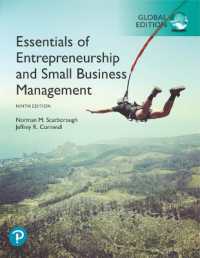- ホーム
- > 洋書
- > 英文書
- > History / World
Full Description
Situated at the intersections between history and literature, the book explores the life-stories written in the Mughal period to recover socio-cultural developments in the period. It focuses on the genre of life-stories and looks at the complex interactions between agency and the ruling structure in shaping historical formations.
The biographical dictionaries explored in this book highlight the significance of the agency of political actors, and the strategies through which the aristocrats and the elites reproduced the political system. At the same time, these texts are also quite helpful in recovering processes through which the ordinary people, in routine, everyday forms negotiated with and contested the political system. Delving into the life-narratives preserved in the tazkiras or biographical compendia, this book looks at the household as a political formation and positions the aristocratic households as integral to the reproduction of imperial sovereignty. The work also delves into the world of emotions and argues for the need to draw linkages between political developments and shifts in emotions and affect.
This book will be an essential resource for scholars and researchers of history especially early modern history, cultural studies, literature, sociology, South Asian history. It will also be of interest to those studying gender and political discourse in early modern South Asia.
Contents
Acknowledgements. 1. Introduction 2. 'Domesticity' as a Political Space in the tazkiras: Constructing the Mughal Household through Emotions, Gastronomy and Politics 3. Structuring the Body and Selfhood: Gender, Civility and Norms of Masculinity in the Mughal tazkiras 4. Representation of the Politics of Fosterage and Fealty in the tazkiras 5. An Alternative Gaze: Constructing the Agency of Women through the tazkiras 6. The Liminals in the Lives of the Ruling Elites: Marginal Social groups in the Mughal tazkiras 7. Conclusion. Bibliography. Index.







